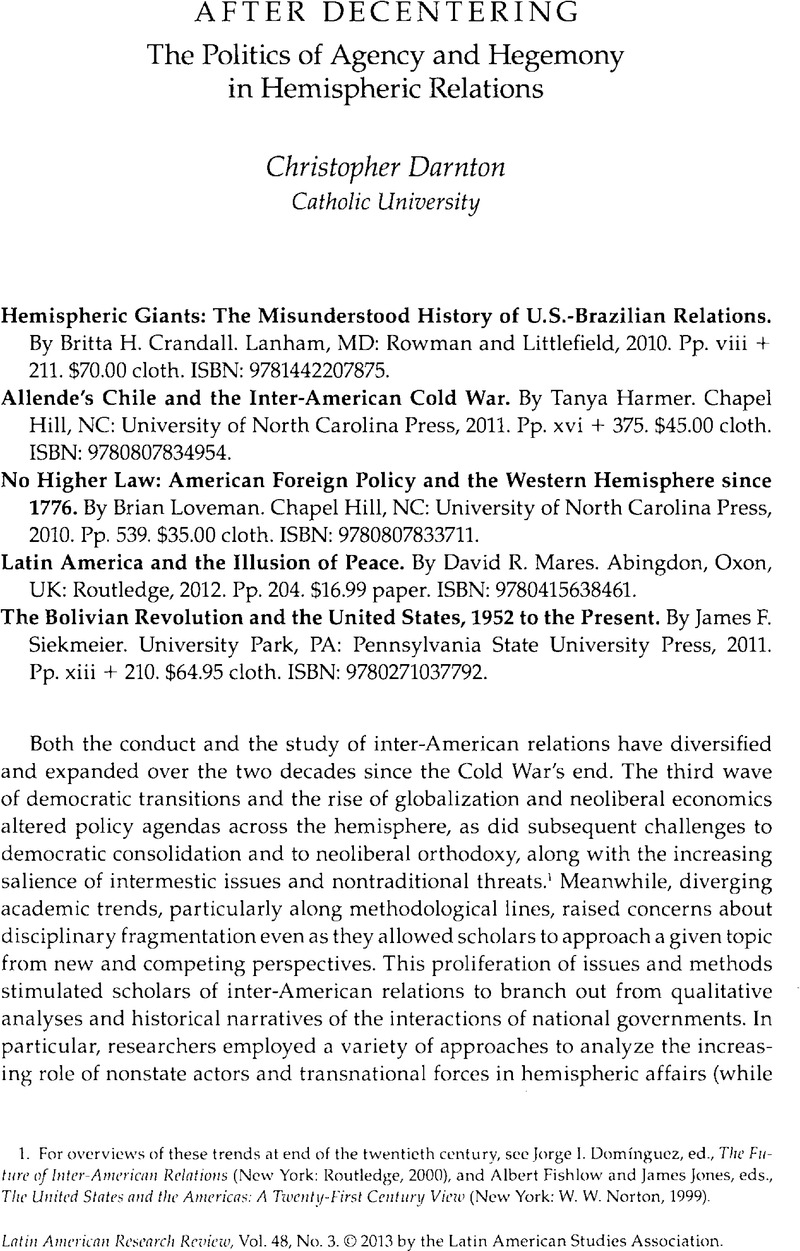Article contents
After Decentering: The Politics of Agency and Hegemony in Hemispheric Relations
Review products
Published online by Cambridge University Press: 05 September 2022
Abstract

- Type
- Review Essays
- Information
- Copyright
- Copyright © 2013 by the Latin American Studies Association
References
1. For overviews of these trends at end of the twentieth century, see Jorge I. Domínguez, ed., The Future of Inter-American Relations (New York: Routledge, 2000), and Albert Fishlow and James Jones, eds., The United States and the Americas: A Twenty-First Century View (New York: W. W. Norton, 1999).
2. See, e.g., Margaret E. Keck and Kathryn Sikkink, Activists beyond Borders: Advocacy Networks in International Politics (Ithaca, NY: Cornell University Press, 1998); William I. Robinson, Latin America and Global Capitalism: A Critical Globalization Perspective (Baltimore, MD: Johns Hopkins University Press, 2008); Fred Rosen, ed., Empire and Dissent: The United States and Latin America (Durham, NC: Duke University Press, 2008); and most recently Marisa von Bülow, Building Transnational Networks: Civil Society and the Politics of Trade in the Americas (New York: Cambridge University Press, 2010), winner of LASA's inaugural Luciano Tomassini Latin American International Relations Book Award.
3. On decentering, see particularly Max Paul Friedman, “Retiring the Puppets, Bringing Latin America Back In: Recent Scholarship on United States-Latin American Relations,” Diplomatic History 27, no. 5 (2003): 621-636; also Federico Gil, Latin American-United States Relations (New York: Harcourt Brace Jovanovich, 1971); Odd Arne Westad, The Global Cold War: Third World Interventions and the Making of Our Times (New York: Cambridge University Press, 2005); Hal Brands, Latin America's Cold War (Cambridge, MA: Harvard University Press, 2010). For critiques of US policy, see, e.g., Lars Schoultz, Beneath the United States: A History of U.S. Policy toward Latin America (Cambridge, MA: Harvard University Press, 1998); Greg Grandin, Empire's Workshop: Latin America, the United States, and the Rise of the New Imperialism (New York: Metropolitan Books, 2006).
4. The thesis about US limitations and Chilean agency is consistent with the canonical political science explanation for the collapse of Allende's regime (emphasizing domestic political polarization, along with electoral, military, and partisan institutions), absent from Harmer's otherwise outstanding bibliography: Arturo Valenzuela, “Chile,” in The Breakdown of Democratic Regimes, ed. Juan Linz and Alfred Stepan, part 4 (Baltimore, MD: Johns Hopkins University Press, 1978). Similarly, because more recent scholarship recognizes both Chilean and non-Washington-based foreign contributions to the crisis that toppled Allende, Harmer's framing of debates occasionally seems a bit forced, as in the reduction of Jonathan Haslam's discussion of “assisted suicide” to an exemplar of “blame” and “masterminding” (7). See Jonathan Haslam, The Nixon Administration and the Death of Allende's Chile: A Case of Assisted Suicide (New York: Verso, 2005), particularly xiv, 226-228.
5. Harmer (20-22) is more cautious about Chile's significance to the Alliance for Progress; Haslam, however, argues that Chile was “the showcase” for the Alliance (The Nixon Administration and the Death of Allende's Chile, 12).
6. See, e.g., Colin Elman and Miriam Fendius Elman, eds., Bridges and Boundaries: Historians, Political Scientists, and the Study of International Relations (Cambridge, MA: MIT Press, 2001).
- 4
- Cited by




